The Greensborough Patriot
May 8, 1862
Page 3
Surrender of Fort Macon.
Fort
Macon was surrendered to the enemy last Friday night, after a bombardment of
some 12 or 13 hours. The enemy, working
by night, had erected batteries behind the large sand banks, which the Island
afforded and mounted guns within 1100 yards of the Fort. This was unknown to Col. White, the
Commandant. The enemy, ready to commence
the attack on Friday morning, summoned Col. White to surrender. This was peremptorily declined. Another summons was sent and declined, and
finally a personal interview with Col. White was requested. This was granted, but the gallant Colonel
plainly told them that the Fort could not be taken by talking; and that nothing
but fighting could induce a surrender.
The Colonel was accommodated. At
it they went, the enemy’s guns opening fire at 6 ¼ o’clock, A.M. The bombardment continued throughout the day
with terrific destruction to the Fort, but fortunately with little loss of life
to the brave little garrison.
The
enemy inland was directed by signals from the fleet, when the balls fell over
the Fort or short of their designation.
Thus was gained great accuracy in firing. The glacis was ploughed up to the depth of
many feet. The pancope was literally
demolished and the moat filled with debris.
The enemy knew exactly where the magazine was located, and dropped
hundreds of shell and solid shot on the spot with the precision of a man piling
them by hand. Things began to look
squally. The walls of the Fort were not
only breached at several points, but literally torn into pieces
everywhere. All the guns pointing inland
and fronting on the enemy, except three, were dismounted and only three left
which could be brought to bear upon him.
Half a dozen more shots which could be fired in as many minutes, would
explode the magazine. About 7 o’clock,
P.M., the colors were hauled down. A
parlay was had. Col. White would
surrender on condition that he should be allowed to march out his garrison with
the honors of war, the officers wearing their side arms, and that privates
property would be respected.
This
was refused. Then said the Colonel “we
must fight it out—on no other conditions will I surrender. We must go to shooting again.” The Yankee officer jocosely remarked he
didn’t like this shooting. Col. White
expressed himself as having no great love for it but he had no
alternative. The terms were finally
granted. The garrison retired to rest
for the night, in the demolished Fort, and on Saturday morning marched out in
accordance with the terms set forth.
Capt.
Poole’s company and such of the garrison as did not live at a distance from the
coast, were put on board and carried to Beaufort, or some point adjacent. Col. White, with about 155 men were shipped
on board the U. S. Gunboat, Chippewa, and sent under a flag of truce to the
neighborhood of Fort Caswell, where they were received on one of our own
steamers, and arrive in Wilmington, Monday night. Our loss in the action has been variously
stated at seven killed—in which all agree; and eighteen wounded, (some say
eleven) two of them mortally.
We
are glad to hear that with a few exceptions, every man in the Fort fought like
a Spartan. We are also glad to be able
to record for Capt. Poole’s men, from whom so many scoundrels had deserted,
that they were not behind the bravest in the action. Officers and men, all stood at their posts,
throughout a tremendous iron storm, for upwards of 12 hours; Col. White
visiting them at every gun, and reminding them of their duty for the Old North
State and their common country, whose eyes were then upon them. God bless them, they proved worthy of such a
Colonel and such a country; and only surrendered when their last gun was
shattered into fragments, the Fort a pile of ruins around them, and the
Magazine on the very eve of exploding.
The assistant editor of this paper may justly feel proud in being
represented by another son among that gallant band, of whose conduct we have
been told he need not be ashamed. He saw
Col. White on Tuesday night at Goldsboro, also several of his officers and
men. They seemed equally proud of each
other. The Colonel, pending his parole,
visits his relatives in Mississippi and carries with him all the glory and
honor that an incorruptible patriot and brave soldier can claim.
The
loss of the enemy is supposed to be inconsiderable.—State Journal.





